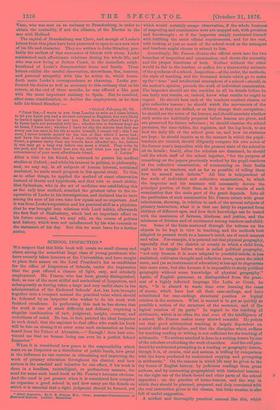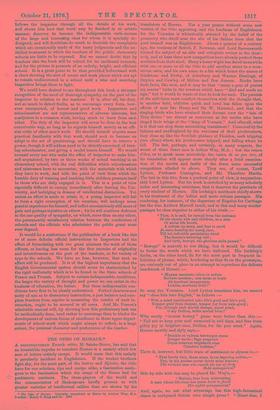SCHOOL INSPECTION.*
WE suspect that this little book will create no small dismay and alarm among the somewhat large class of young gentlemen who lave recently taken honours at the Universities, and have sought to place their names on the Lord President's list as candidates for the office of Inspectors of Schools, under the impression that the post offered a chance of light, easy, and scholarly employment. Mr. Fearon, who has been greatly distinguished, first, as one of the most skilful and methodical of Inspectors, and subsequently as having taken a large and very useful share in the administration of the Endowed Schools' Act, has here brought together into a compact manual the practical rules which should be followed by an inspector who wishes to do his work with finished excellence. In performing this task he has shown that the work is one of much difficulty and delicacy, requiring a singular combination of tact, judgment, insight, courtesy, and orderliness of mind. He has, in fact, painted the ideal Inspector in such detail, that the aspirant to that office who reads his book will be fain on closing it to utter some such exclamation as Imlac beard from the Prince of Abyssinia,—" Enough ! thou hest con- vinced me that no human being can ever be a perfect School Inspector."
When it is considered how grave is the responsibility which rests on an Inspector as a distributor of public funds, how great is the influence he can exercise in stimulating and improving the work of primary education throughout his district, and how serious is the mischief and injustice he can effect, if his work is done in a heedless, unintelligent, or perfunctory manner, the need for some such band-book as Mr. Fearon's becomes obvious. And the need is yet greater when it is considered how complex an organism a good school is, and how many are the details on which it is essential that a right judgment should be formed, yet
School Inspection. By D. it. Fearon, M.A., Oxon., Assistant-Commissioner of Endowed Schools. London: Macmillan.
which would certainly escape observation, if the whole business of inspecting and examination were not mapped out, with precision and forethought ; or if the inspector simply contented himself with fulfilling the strict official requirements, and for the rest, with looking at just so much of the school-work as the managers and teachers might choose to submit to him.
Accordingly, Mr. Fearon divides the official work into the two branches of inspection and examination, and shows the necessity
and the proper functions of both. Neither without the other would be fair to the teacher, or suffice for a trustworthy estimate of the goodness of a school. Inspection—of the order, the methods, the style of teaching, and the thousand details which go to make up the" tone" and intellectual atmosphere of a school—should, in the author's opinion, precede the work of individual examination. The inspector should see the machine in all its details before he can fairly test results, or, indeed, know what results he ought to expect. He should hear each of the teachers conduct classes, or give collective lessons ; be should watch the movements of the children, as they are drilled, or as they change their occupation ; he should see the notes of the lessons, and should ascertain whether such notes are habitually prepared before lessons are given, and are preserved for future reference ; he should examine the school premises, the time-tables, the registers, and the log-book, to see how the daily life of the school goes on, and how its statistics are kept ; he should inquire as to the manner in which the pupil- teachers are trained, should diligently compare his own notes of the former year's inspection with the present state of the school in all its details ; finally, after the scholars are dismissed, he should call the whole staff of the school together, "for the purpose of remarking on the papers previously worked by the pupil-teachers at the collective examination, of commenting on their faults and merits as teachers, and as far as possible, of telling them how to amend such defects." All this is independent of the work of individual and collective examination, to which the inspector and his assistant will necessarily devote the principal portion of their time, as it is on the results of such examination that the main part of the grant depends. Into all the particulars of such examination Mr. Fearon enters with great minuteness, showing, in relation to each of the several subjects of primary instruction, what it is that can fairly be expected from children of different ages, and how their knowledge can be tested with the maximum of fairness, kindness, and justice, and the minimum of friction and of excitement among teachers and child- ren. Some of the hints scattered through the volume on the objects to be kept in view in teaching, and the methods best adapted to present truth to a learner's mind, are of much interest and value. For example, it is pointed out that physical geography, especially that of the district or county in which a child lives, ought to be taught before what is called political geography, "not only because it is more adapted to youthful minds, is less statistical, cultivates thought and reflection more, opens the mind more, and (as an instrument of education) is less apt to degenerate into mere cram, but also because it is impossible to study political geography without some knowledge of physical geography." Again, of English grammar, as distinguished from the gram- mar of a highly inflected language like Latin or Greek, he says, "It is absurd M waste time over learning the cases of nouns, which have lost all their case-endings, and have substituted for case-endings structural position or logical relation in the sentence. What is wanted is to get as quickly as possible a notion of the structure of the sentence, and of the logical relation of its parts." In regard to the teaching of arithmetic, which is so often the real crux of the intelligence of a school, Mr. Fearon makes many shrewd remarks. He points out that good arithmetical teaching is largely dependent on mental drill and discipline, and that the discipline which suffices for teaching reading or writing is not sufficient for the teaching of arithmetic. "No serious mischief is done in a writing-lesson by one of the scholars overlooking the work of another. And the evil pro- duced by undetected prompting in a reading or geography-lesson, though it is, of course, real and serious, is trifling by comparison with the harm produced by undetected copying and prompting in arithmetic." On the manner in which life may be given to the dry bones of English history, by judicious readings from great authors, and by connecting geographical with historical lessons ; on the right use of the black-board and other parts of the school apparatus ; on the practice of home-lessons, and the way in which they should be planned, prepared, and duly correlated with the oral instruction given in the classes, this little treatise is also full of useful suggestion.
A modest and thoroughly practical manual like this, which follows the inspector through all the details of his work, and shows him how that work may be finished in an artistic manner, deserves to become the indispensable vade-mecum of the large and increasing class for whom it is specially de- designed, and will doubtless do much to diminish the complaints which are occasionally made of the hasty judgments and the un- skilled treatment to which the teachers of the public elementary schools are liable to be exposed. But we cannot doubt that by teachers also the book will be valued for its incidental counsels, and for the picture it presents of an orderly, bright, and efficient schooL It is a great point to be thus provided beforehand with a chart showing the sort of errors and weak places which are apt to remain undiscovered in a school until a wise and searching inspection brings them to light.
We could have desired to see throughout this book a stronger recognition of the need of thorough sympathy on the part of the inspector in relation to the teachers. It is, after all, his duty, not so much to detect faults, as to encourage every form, how- ever unexpected, of honest and good work. Inspectors and schoolmasters are not representatives of adverse interests, but coadjutors in a common work, having much to learn from each other. The duty of the inspector will never be done in the best conceivable way, so long as he regards himself merely as an offi- cial critic of other men's work. He should himself acquire some practical familiarity with that work, should seek to become an adept in the art of questioning, and should have in reserve a power, though it will seldom need to be directly exercised, of turn- ing schoolmaster, and giving a model lesson himself. We would counsel every one who seeks the office of inspector to make him- self acquainted, by two or three weeks of actual teaching in an elementary school, with the real difficulties which schoolmasters and mistresses have to encounter, with the materials with which they have to work, and with the point of view from which the humble duty of training and teaching little children presents itself to those who are daily engaged in it. This is a point of view especially difficult to occupy immediately after leaving the Uni- versity, and indulging in dreams of intellectual distinction. Yet unless an effort is made to attain it, a young inspector will fail to form a right conception of his vocation, will undergo some painful experience for himself, and inflict unconsciously still more of pain and perhaps injustice on others ; forbe will continue deficient in the one quality of sympathy, on which, more than on any other, the permanently satisfactory relation between the conductors of schools and the officials who administer the public grant must ever depend.
It would be a misfortune if the publication of a book like this or of more definite official instructions to Inspectors had the effect of formulating with too great niceness the work of those officers, or leaving less room for the free exercise of originality and inventiveness on the part of the teachers, or for variety of type in the schools. We have no fear, however, that such an effect will be produced. It is of the highest importance that the English Governmental system should never be characterised by the rigid uniformity which is to be found in the State schools of France and Prussia. Subject to certain indispensable conditions, the larger the variety of thought and power we can enlist in the business of education, the better. But these indispensable con- ditions have first to be clearly understood. Perfect clearness and unity of aim as to elementary instruction, a just balance and com- plete freedom from caprice in measuring the results of such in- struction, ought to be secured in all cases. And Mr. Fearon's admirable manual will, by showing how this preliminary task can be methodically done, tend rather to encourage than to hinder the development of various forms of excellence in those upper depart- ments of school-work which ought always to reflect, to a large extent, the personal character and preferences of the teacher.



































 Previous page
Previous page